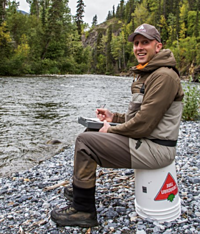This CHE-Alaska presentation focused on the Risks Of Mining To Salmon And Trout-Bearing Watersheds, a recently published article highlighting how mining affects salmon and trout bearing watersheds in the Pacific Northwest. Lead author Chris Sergeant described mine permitting and development, and identify stages in the process where potential mining-related harms can be identified and mitigated before they occur. Sergeant and co-authors write:
“Considering that mining activities can have impacts that are long-lasting, spatially extensive, and costly to mitigate, there is a clear need to effectively link the science and known complexity of mining impacts to risk assessment and decision-making, particularly in ecosystems that support species of cultural and economic importance.”
Alaska Public Media’s recent radio show on Critical Minerals in Alaska described how existing and future mineral demands may increase the pressure to develop new mines in Alaska, including the mining of minerals required for a transition to renewable energy. Alaska is also home to the world’s most pristine and productive salmon habitat, and the state has already been grappling with how to balance mining and ecosystem health (e.g. proposed Pebble Mine). This webinar included discussion of best practices for using science to inform mining policy in Alaska.
Featured Speaker
 Christopher Sergeant is a research scientist at the University of Montana’s Flathead Lake Biological Station and doctoral student at the University of Alaska Fairbanks’ College of Fisheries and Ocean Sciences. His research focuses on freshwater ecology, long-term monitoring, salmon biology, and mining impacts, and he has worked specifically on the emerging pressures on freshwater ecosystems of southeastern Alaska. A more complete description of his accomplishments, research, and recent publications can be found on his University Montana webpage.
Christopher Sergeant is a research scientist at the University of Montana’s Flathead Lake Biological Station and doctoral student at the University of Alaska Fairbanks’ College of Fisheries and Ocean Sciences. His research focuses on freshwater ecology, long-term monitoring, salmon biology, and mining impacts, and he has worked specifically on the emerging pressures on freshwater ecosystems of southeastern Alaska. A more complete description of his accomplishments, research, and recent publications can be found on his University Montana webpage.
Speaker photo by E. Sketchley courtesy of University of Montana Flathead Lake Bio Station
 This call was hosted by the CHE-Alaska Partnership, which is coordinated by Alaska Community Action on Toxics (ACAT).
This call was hosted by the CHE-Alaska Partnership, which is coordinated by Alaska Community Action on Toxics (ACAT).
